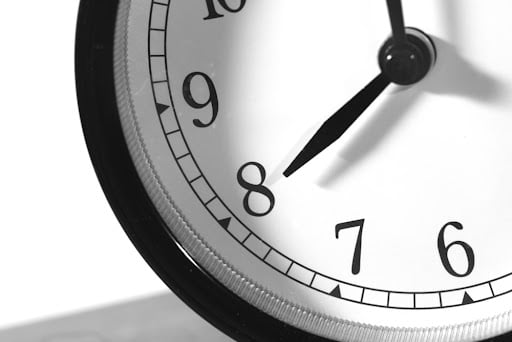Complete Guide to Time in Chinese

Understanding the concept of time (shí) in Chinese is a fairly important concept to get your head around. From telling the time to organizing meet-ups with colleagues or friends, being able to communicate about time in Chinese is a fairly fundamental skill to learn about.
In this guide, we’re going to walk you through everything from understanding the Chinese time system to being able to discuss time in everyday life. We’re also going to add some fairly vital time words that you can use to make your Mandarin Chinese sound a little more like a native and less like you’re reading from a study guide.
Learning how to tell time is essential for daily life in China. This comprehensive guide covers everything you need to know about time in Chinese (Zhōngguó shíjiān) 中国时间, from numbers to vocabulary to cultural tips. Let’s get started.
Related Reading: Numbers in Chinese: How to Count And More
Time in Chinese — The Chinese character “时” (shí)
First off, let’s take a look at the Chinese character breakdown:
Time in Chinese – “时” (shí) – time, when, timely
The left semantic component in 时 is the Sun 日, which makes perfect sense when considering the Sun’s instrumental role in our determination of time.
Next, let’s look at the three most common words 时 (shí) is used in:
小时 (“xiǎoshí”) — Hour
“Hey, Xiao Wang, what should we call an hour?”
“Hmm, I don’t know, how about just “small (小) time’?”
“Great idea!”
OK, so this probably wasn’t how it actually went down when deciding what to call an hour of time, but I remember laughing at this imaginary scenario when I first started studying Chinese. How long is an hour? Well, just a small (小) amount of time (时).
时间 (jiān)- (the concept of) time
时候 (hòu)- (a moment in) time
When referring to the most common definitions of the above two words, the easiest way to distinguish between them is to remember that we have considerably different meanings when we’re saying something like “Do you have any time?” (时间) vs. “I was fighting crime at the time when you called me” (时候).
The first is just the concept of time in general; it is not specifically related to any moment, whereas the second is a reference to the moment you were bringing law and order to your town.
If you want to just ask somebody if they have time, you would say 时间 (“你有没有时间 ní yǒu méi yǒu shíjiān”), but if you want to refer to the time that something happened or will be happening, you can just say “[Insert Event] + 的时候 (de),” “Fighting crime 的时候, you called me.”
This is why the word “when” in Chinese is literally “what + moment in time” or “什么时候 shénme shíhòu.”
The four most important words indicating time in Chinese
当时 (dāng)
随时 (suí)
按时 (àn)
准时 (zhǔn)
These four words all have a character preceding “时” that indicates a relationship to time. “当” in this context means “just at,” so “just at-time” is another way of saying then or at that time. You’ll use this often when explaining your actions at a certain time in a story.
Many Chinese learners learn the word for “casual” or “informal” (随便 suíbiàn) quite early in their studies, and that same character 随, when combined with 时, creates the meaning of “at any time” or “whenever.” What could be more casual?
按时 and 准时 can both be translated as on time or on schedule, and this makes sense that 按 and 准 can both mean “in accordance with.” The only significant difference between the two words is that 准时’ can be used as an adjective to mean punctual.
时机 (jī)
时报 (bào)
过时 (guò)
These three words all relate to things that are timely in some way. For example, the word for “opportunity” in Chinese is 机会 jīhuì, but if you really want to emphasize that an opportunity is particularly limited by time, aka an opportune moment, you can use 时机.
时报 could be literally translated as “timely report” or “timely newspaper.” No wonder the New York Times is translated to 纽约时报 niǔyuē shíbào.” The final word, 过时, relates to things whose time has already gone, which is another way of saying outdated.
The basics of telling time in Chinese
China, like most of the world, tells time in a 24-hour digital format. However, in spoken and written Chinese, the 12-hour clock with AM/PM is still commonly used very often in daily life.
To say the hour in Chinese, you need to use the measure word diǎn 点 after the number:
- Seven o’clock — qī diǎn 七点
- Eight o’clock — bā diǎn 八点
- Nine o’clock — jiǔ diǎn 九点.

When stating the hour, the measure word diǎn is essential in Chinese. Without it, the time expression would be incomplete grammatically. For minutes, you need to use the word fēn 分 after the number of minutes:
- 6:45 — liù diǎn sì shí wǔ fēn 六点四十五分
The measure word fēnzhōng specifically indicates minutes in Chinese. When telling time in Chinese, the words used for hours and minutes are, obviously, very important.
- For hours, the measure word diǎn must be used after the number, such as sì diǎn for four o’clock. The measure word diǎn indicates you are talking about a full hour.
- For minutes, the word fēnzhōng must be used, such as sìshí wǔ fēn for 45 minutes. Fēn specifically refers to minutes.
Without using the proper measure words for hours (diǎn) and minutes (fēn), the time expression will not be grammatically correct or clear.
For an approximate time, you can say chàdiǎnr, which literally means “a little before.” For example:
- It’s chàdiǎnr sì diǎn — It’s a little before 4:00
Or you can use chàdiǎnr with bàn 半 for half:
- It’s chàdiǎnr sì diǎn bàn — It’s a little before 4:30.
But for the exact time, you need to use precise vocabulary and grammar. The measure words diǎn and fēnzhōng are always essential for telling accurate times in Chinese.
Some other key vocabulary for telling time in Chinese includes:
- Clock — zhōng 钟
- Watch — shǒubiǎo 手表
- Hour hand — shízhēn 时针
- Minute hand — fēnzhēn分针
- Digital clock — diànzǐ shízhōng 电子时钟
- Analog clock — Zhǐzhēn shízhōng 指针时钟
Related Reading: The Importance of Pronunciation in Chinese
AM and PM in Chinese
- AM is shàngwǔ 上午
- PM is xiàwǔ 下午.
When using the 12-hour clock, it’s important to specify AM or PM by using shàngwǔ or xiàwǔ.
Some examples:
- Nine AM — shàngwǔ jiǔ diǎn 上午九点
- Four PM — xiàwǔ sì diǎn 下午 四点
- Eleven AM — shàngwǔ shíyī diǎn 上午十一点
- Eight PM —xiàwǔ bā diǎn 下午八点
Without indicating AM or PM, the time expression would be unclear.
Related Reading: Is Chinese Hard to Learn?
Half and quarter hours in Mandarin
When telling time in Chinese, you’ll often need to refer to half and quarter hours rather than just the full hour. Expressions like “half past eight o’clock” or “a quarter past eight” are very common when stating time in Mandarin. This section will explain how to say half and quarter hours, like half past eight or quarter past seven:
- Bàn 半 means half:
- Half past six — liù diǎn bàn 六点半
- Half past seven — qī diǎn bàn 七点半.
- Yīkè 一刻 means quarter:
- A quarter past eight — bā diǎn yī kè 八点一刻
- A quarter to nine — bā diǎn sìshíwǔ fēn 八点四十五分 or jiǔ diǎn sān kè 差一刻九点

When telling the time in Chinese, you’ll need to use words like bàn and yīkè to indicate partial hours. Mastering vocabulary for partial hours is a pretty essential part of learning how to tell time in Chinese. Whether you’re talking about your morning schedule, arranging a meeting, or reading a train timetable, knowing how to say half hours and quarters past the hour will help you tell and understand time in Mandarin accurately.
Some other useful expressions include:
- 10 past 6 — liù diǎn shí fēn 六点十分
- 20 to 8 — bā diǎn chà èrshí fēn 八点差二十分
- 5 before 9 — jiǔ diǎn chà wǔ fēn 九点差五分
Related Reading: Basic Chinese Sentence Structure
Asking for the time in Chinese
Knowing how to ask for the current time in Chinese is essential for daily life conversations. There are a few different ways to politely request the time in Mandarin, from casual to formal. Let’s look closer at the basic phrases and question words needed to ask what the time in Chinese is, such as “Qǐngwèn, xiànzài jǐ diǎn?” and “Xiànzài duōshao diǎn le?”
You’ll also learn how to ask more specifically about the exact time in Mandarin, for example, “Excuse me, do you know what time it is now – is it half past eight or bā diǎn shí fēn?” Mastering how to ask for the time in Chinese, both casually and politely, is key for communicating and arranging meetings in daily life.
The most common way to ask for the time is:
“Xiànzài jǐ diǎn? 现在几点?”
Literally, this means, “Right now what time?”
You can also ask:
“Qǐng gàosu wǒ, xiànzài jǐ diǎn? 请告诉我, 现在几点?”
Which means, “Please tell me, what time is it now?”

To be very polite, you can say:
“Qǐngwèn, nín zhīdào xiànzài jǐ diǎn ma? 请问, 您知道现在几点吗?”
This means, “Excuse me, do you know what time it is now?”
When asking for the time, use question words like “jǐ 几” and duōshao “多少” before diǎn 点.
Related Reading: Understanding Chinese Characters: the Basics You Need to Know
Helpful Chinese time vocabulary
Beyond just numbers, learning essential time vocabulary in Mandarin Chinese is key to fluency. So let’s look next at the useful time words and expressions for talking about different times of day, like morning, afternoon, and evening.
Knowing how to say “Monday morning” vs. “Sunday evening” in Mandarin will help you discuss schedules, arrange meetings, and sound more like a native Chinese speaker. Whether making small talk about your daily routine or confirming important plans over the phone, this vocabulary will help you describe time much more precisely.
Mastering these time words and phrases in Mandarin Chinese will improve your ability to communicate about daily life with Chinese people.
Here are some common time words (Zhōngwén shíjiān cí) 中文时间词 for different times of day:
- Early morning — 早上 zǎoshang
- Morning — 上午 shàngwǔ
- Noon — 中午 zhōngwǔ
- Afternoon — 下午 xiàwǔ
- Evening — 晚上 wǎnshang
- Late night — 深夜 hǎnyè
You can also use more specific vocabulary words like:
- Dawn — 黎明 límíng
- Sunrise — 日出 rìchū
- Midday — 中午 zhōngwǔ
- Sunset — 日落 rìluò
- Midnight — 午夜 wǔyè
- Daybreak — 破晓 pòxiǎo
- Dusk — 黄昏 huánghūn

Vocabulary for different parts of the day also helps you describe time more precisely. Some words for duration of time include:
- Moment — 一会儿 yīhuìr
- Hour — 小时 xiǎoshí
- Day — 日子 rìzi
- Week — 星期 xīngqī
- Month — 月 yuè
- Year — 年 nián
Related Reading: 9 Ways to Say Good Night In Mandarin Chinese
Cultural tips for time in China
In addition to grammar and vocabulary, understanding cultural aspects of time in Mandarin is essential. There is some important etiquette about punctuality, scheduling meetings, and tardiness in China. For example, arriving more than 15 minutes (a quarter past) late to dinner with a Chinese friend or business partner might be seen as impolite.
Tips like avoiding meetings before 9 o’clock in the morning and respecting afternoon nap time around 2 o’clock (liǎng diǎn) will help you interact more sensibly with Chinese time. Whether you need to discuss meeting up with a language partner at 7 o’clock or arrange a work lunch in Beijing, these cultural insights on time in Mandarin will improve your communication skills and relationships.
- Be on time or slightly early for meetings and appointments in China. Punctuality (zhǔnshí) 准时 is valued.
- Avoid scheduling early morning meetings before 9 AM if possible. The Chinese often see this time as too early (zǎo) 早.
- Afternoon nap time is taken seriously — many businesses close between one and three in the afternoon. Schedule accordingly.
- The Chinese use the 24-hour clock for official purposes like train schedules but rely on the 12-hour clock for daily spoken Chinese (Huáyǔ shíjiān) 华语时间.
- Gift-giving and dining invitations are usually scheduled around culturally significant times like holidays, birthdays, and anniversaries rather than strict time slots.
- More informal social gatherings may start and end later than the stated time. Don’t take offense if your Chinese friends arrive 30 minutes later than planned.
Related Reading: Declining an Invitation: How to Say “Not This Time” In Chinese?

Talking about time periods in Chinese
Just like in English, you can refer to specific time periods like days, weeks, months, and years in Chinese:
- Day — 天 tiān
- Week — 星期 xīngqī
- Month — 月 yuè
- Year — 年 nián
Some examples:
- Last week — 上星期 shàng xīngqī
- Next month — 下月 xià yuè
- This year — 今年 jīnnián
- Last year — 去年 qiánnián
- Next year — 明年 míngnián
- Yesterday — 昨天 zuótiān
- Today — 今天 jīntiān
- Tomorrow — 明天 míngtiān
You can also specify dates:
- January 1st — 一月一号 Yī yuè yī hào
- March 15th — 三月十五号 Sān yuè shíwǔ hào
- June 30th — 六月三十号 Liù yuè sānshí hào
Being able to refer to dates, days of the week, and other time periods is useful for making plans and scheduling in Chinese.
Related Reading: How to Order Chinese Food in a Chinese Restaurant

Idioms and chengyu about time
Beyond just vocabulary for telling time in Mandarin, the Chinese language has many idiomatic expressions related to time. There are many common chengyu (four-character idioms) that include time words and phrases like “never too old to learn” and “time and tide wait for no man.” Learning these set phrases will help you sound more fluent and native-like when discussing time topics.
These idioms can help you sound more native and fluent when talking about time.
Related Reading: The Definitive Guide to Chinese Proverbs, Sayings, and Quotes
Telling time in real-life situations
While the vocabulary, numbers, and grammar rules for telling time are important, being able to apply them in real conversations is essential. Next up, we’re going to look at examples of telling and asking about time in Mandarin in everyday dialogues and situations. You’ll see how to use expressions like “eight o’clock” and “seven o’clock” when making plans to meet up or scheduling appointments.

Practicing phrases like “What time does the movie start?” and “We need to catch the 5:30 train” will help reinforce your Chinese numbers and time-telling skills. Whether you need to discuss tomorrow’s schedule or arrange a business lunch using daily Chinese, these practical examples will help you describe time accurately and naturally.
Putting the time words and phrases together in realistic contexts is key for taking your Mandarin fluency to the next level. Here are some examples of how to use time expressions in real-world conversations and situations:
- What time does the movie start? Diǎnyǐng jǐ diǎn kāishǐ? 电影几点开始?
- I’ll meet you at seven o’clock. Wǒ qī diǎn gēn nǐ huìhé. 我七点跟你会合。
- We need to catch the five thirty train. Wǒmen xūyào gǎn shàng wǔ diǎn sānshífēn de huǒchē. 我们需要赶上五点三十分的火车。
- I have a meeting at two fifteen this afternoon. Jīntiān xiàwǔ liǎng diǎn shíwǔ fēn, wǒ yǒu yīgè huìyì.. 今天下午两点十五分,我有一个会议。
- What time are we meeting tomorrow? Míngtiān wǒmen jǐ diǎn jiànmiàn? 明天我们几点见面?
- Can we move our appointment to 10 AM next Thursday? Wǒmen néng bǎ huìyì gǎi dào xiàzhōu xīngqīsì shàngwǔ shí diǎn ma? 我们能把会议改到下周星期四上午十点吗?
Practicing telling time in realistic conversations is one of the best ways to improve your Chinese speaking skills.
Related Reading: The Surprising Benefits of Learning a Language from a Non-Native Speaker
Become a master of Chinese time
Whether you just need to know how to tell time in Chinese (zěnme shuō Zhōngwén shíjiān) 怎么说中文时间 for daily life or business meetings, this guide covers the key vocabulary, sentence structure, and cultural advice to talk about time like a native Chinese speaker. Study these expressions of time in Mandarin (Huáyǔ shíjiān biǎodá) 华语时间表达, and you’ll be an expert at Chinese time (Zhōngwén shíjiān) 中文时间 in no time!
Unlock fluent Chinese three times faster without spending thousands
Learning Chinese can feel frustrating. Endless study without real conversation skills. But what if there was an easier way?
In our exclusive FREE web class, you’ll discover:
- The three secrets of native Chinese speakers for fluency faster
- A step-by-step method for Mandarin mastery without overwhelm
- How to speak Chinese confidently in just months, not years
- The number-one key to affordably achieving fluency on a budget.
Don’t waste thousands on ineffective classes while feeling lost in textbooks. Join our web class and start speaking Chinese three times faster.
Register now for instant access to real fluency breakthroughs.
You have nothing to lose and conversational Chinese to gain. Invest just 1 hour with us to transform your learning experience. Join the web class now, and in just weeks from today, you’ll be surprising yourself with effortless Mandarin conversations.
Seats are limited — click below to reserve your spot and unlock the exclusive secrets of Chinese fluency success.








